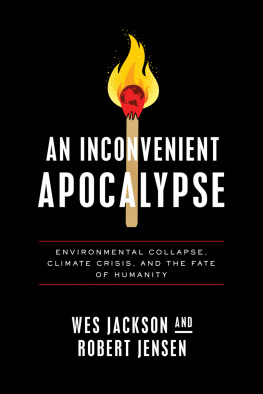Contents
Hogs Are Up
Hogs Are Up
Stories of the Land,
with Digressions
WES JACKSON
Foreword by Robert Jensen

UNIVERSITY PRESS OF KANSAS
2021 by the University Press of Kansas
All rights reserved
Published by the University Press of Kansas (Lawrence, Kansas 66045),
which was organized by the Kansas Board of Regents and is operated
and funded by Emporia State University, Fort Hays State University,
Kansas State University, Pittsburg State University, the University of Kansas, and Wichita State University.
Library of Congress Cataloging-in-Publication Data
Names: Jackson, Wes, 1936 author. | Jensen, Robert, 1958 foreword.
Title: Hogs are up : stories of the land, with digressions / by Wes
Jackson, foreword by Robert Jensen.
Description: Lawrence, KS : University Press of Kansas, [2021]
Identifiers: LCCN 2020036223
ISBN 9780700630592 (cloth)
ISBN 9780700630608 (ebook)
Subjects: LCSH: Jackson, Wes, 1936 | Human ecology. |
RadicalsKansasBiography. | Deep ecology.
Classification: LCC GF41 .J324 2021 | DDC 304.2dc23
LC record available at https://lccn.loc.gov/2020036223 .
British Library Cataloguing-in-Publication Data is available.
Printed in the United States of America
10 9 8 7 6 5 4 3 2 1
The paper used in this publication is acid free and meets the minimum requirements of the American National Standard for Permanence of Paper
for Printed Library Materials Z39.48-1992.
For Ken Warren
Contents
by Robert Jensen
Getting the story right can be complicated. Perspective matters. Sometimes the truth sneaks up on you.
Some stories have to wander, and thats just fine.
Living with less cultivates virtues, though a bit of vice is inevitable wherever one lives.
We often learn the most from the most unusual people.
I eventually learned that science isnt a set of facts, theories, or methods but rather is a waythough not the only way
of being in the world.
It can be dangerous to think too much. But its even more dangerous to think too little.
We have a love/hate relationship with the world we have made. We might as well get used to it.
What do we need to be if there is to be a future? Who do we need to be?
Foreword: Tell about It
Robert Jensen
The best summary of Wes Jacksons method for inquiring into the world that I have ever found comes from Mary Oliver, who in her poem Sometimes offered instructions for living a life:
Pay attention.
Be astonished.
Tell about it.
Whether wrangling cows on a patch of Kansas pasture or wrestling with scientific accounts of the origins of life on Earth, Jackson pays attention, is constantly astonished by the world around him, and cant wait to tell someone about it.
Pay attention to everything around and inside you. Pay attention to plants and other creatures, both out in nature and on city streets, because life is everywhere. Pay attention to everyone you meet, even in routine interactions, and never pass up a chance to ask someone what they hope to accomplish in the world. Pay attention to your own reactions to people and places, learning from what attracts and repels you.
Opportunities for astonishment are everywhere if you are paying attention, not only in the extraordinary but also in the everyday. It certainly is astonishing how mountains arose from the crashing of tectonic plates, how the great civilizations of the ancient world rose to power, fell, and disappeared. But just as astonishing is the way that plants can grow in the small amount of soil in the cracks of city sidewalk and the way that love endures despite human cruelty.
Jackson pays attention and is constantly astonished, qualities that he shares with many. What makes him distinctive is how he tells about it. Jackson has written scholarly articles, books, and grant proposals followed up by reports on the projects that those grants funded.











